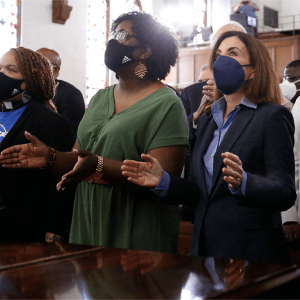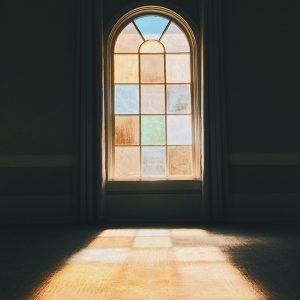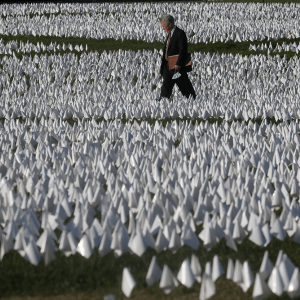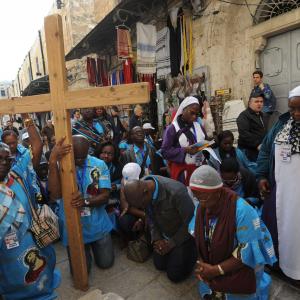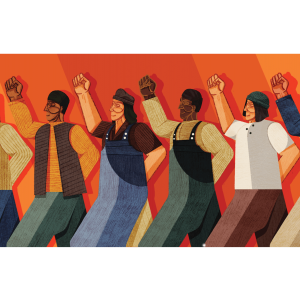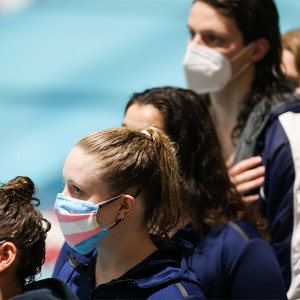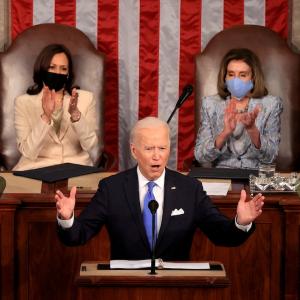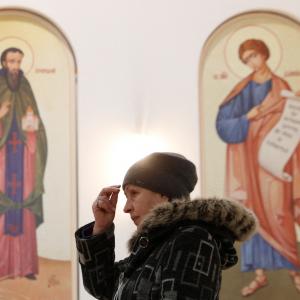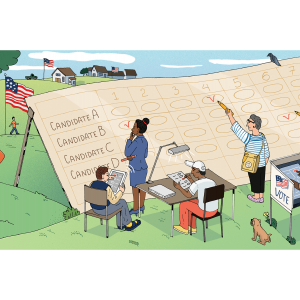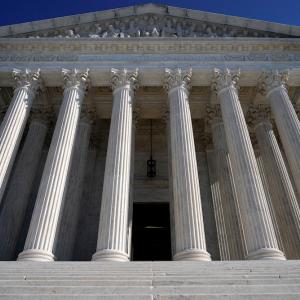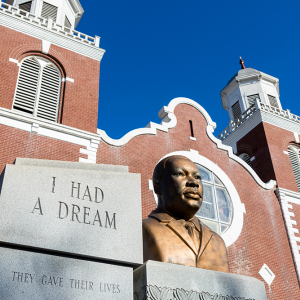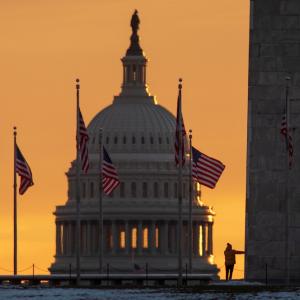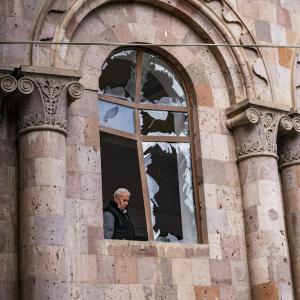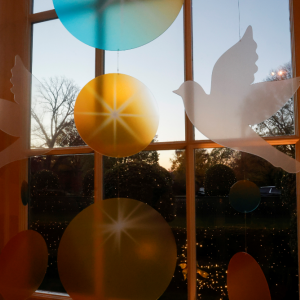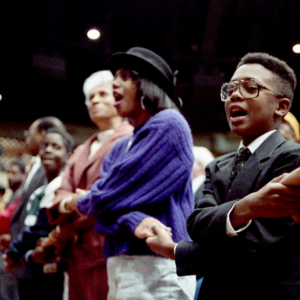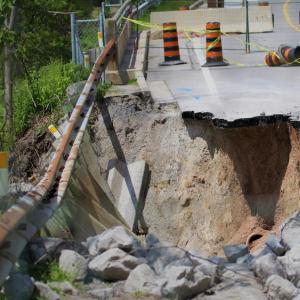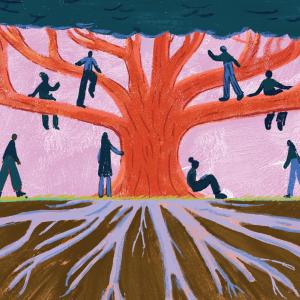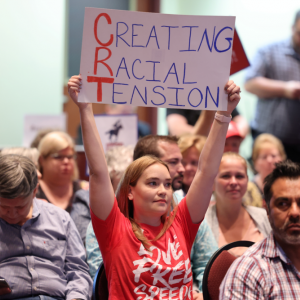
Rev. Adam Russell Taylor is president of Sojourners and author of A More Perfect Union: A New Vision for Building the Beloved Community. Follow him on Bluesky @revadamtaylor.
Taylor previously led the Faith Initiative at the World Bank Group and served as the vice president in charge of Advocacy at World Vision U.S. and the senior political director at Sojourners. He has also served as the executive director of Global Justice, an organization that educates and mobilizes students around global human rights and economic justice. He was selected for the 2009/2010 class of White House Fellows and served in the White House Office of Cabinet Affairs and Public Engagement. Taylor is a graduate of Emory University, the Harvard University Kennedy School of Government, and the Samuel DeWitt Proctor School of Theology. Taylor also serves on the Independent Sector Board, the Global Advisory Board of Tearfund UK, and is a member of the inaugural class of the Aspen Institute Civil Society Fellowship. Taylor is ordained in the American Baptist Church and the Progressive National Baptist Convention and serves in ministry at the Alfred Street Baptist Church in Alexandria, Va.
Speaking Topics
- Human rights and global poverty
- Racial justice
- Voting rights
- Climate justice
- Economic justice
- Immigration
- Peace and nonviolence
- His most recent book, A More Perfect Union: A New Vision for Building the Beloved Community
Speaking Format
- Virtual and in-person events, also available for preaching
Languages
- Fluent in English
Past Notable Events
- Tufts University’s Russell Lecture
- United Church of Christ General Synod Gathering Keynote
- Children’s Defense Fund Staff Retreat Keynote
- Parliament of the World Religions
- Christian Community Development Association Keynote Panel
Posts By This Author
Christians Can’t Be Lukewarm in Denouncing ‘Replacement Theory’
Before the public outcry dies down — and isn’t sad that we all know it will? — we must boldly and unequivocally denounce the great replacement theory and instead live out the great commandment. The great replacement theory draws on the worst of our nation’s history, falsely implying that nonwhite people are threats to our nation’s future. But the great commandment offers the best of our civic and religious values, reminding us that we are to love our neighbors as ourselves; it lends itself to a moral vision of multi-racial democracy in which everyone, regardless of race, ethnicity, and religion, is equally valued.
As a Christian, I Want to Reduce Abortion, Not Overturn Roe
Deeply flawed and alarming. That was my reaction last week as I read the leaked draft of the Supreme Court opinion that would repeal Roe v. Wade, unravelling nearly 50 years of judicial precedent and placing abortion rights into the hands of state lawmakers.
Rereading Paul's Letter to Corinth Amid 1 Million U.S. COVID Deaths
Since the pandemic upended life as we knew it over two years ago, I have found the apostle Paul’s letter to the church at Corinth particularly instructive. In 1 Corinthians 12, Paul provides one of the most poignant metaphors in all of scripture, comparing the health of the church to that of the human body — a comparison that also applies to the health of our broader communities, nation, and world.
A Prayer To Help Us Pause in Holy Week
So as we move through Holy Week, I want to offer a prayer that pauses at each step along Jesus’ journey, from his agony in the garden to the triumphant joy of Easter. As we anticipate Christ’s ultimate victory over sin, death, and injustice on our behalf, let us find the courage to linger in the uncertainty, the suffering, and sacrifice that builds up to the glory of the resurrection.
Celebrating Labor Rights, on May Day and Beyond
Let’s honor working people by advocating for policies that put workers over greed.
ON MAY 1, tens of millions of people across the globe celebrate International Workers’ Day, often called May Day or International Labor Day. Countries around the world have made May Day a major holiday, but its origin as a day to fight for and honor the rights of workers has strong roots in the United States and the struggle for the eight-hour workday. During the Great Depression, Dorothy Day and Peter Maurin chose May Day 1933 to launch the first issue of The Catholic Worker, a newspaper dedicated to the proposition that it is “possible to be radical and not atheist”—an idea that has also been central to Sojourners these past 50 years. In fact, a radical commitment to labor rights and economic justice is because of our faith, not in spite of it.
The dedication and sacrifice of labor activists has led to hard-won rights—including the eight-hour workday, the weekend, safe working conditions, an end to most child labor, and more—rights far too many of us can take for granted. And yet standing up for the dignity and rights of workers remains incredibly important because these rights are not enjoyed by everyone equally and have been relentlessly eroded over the past four decades. The struggle for labor rights has shifted amid an evolution in the nature of work, with many workers exercising greater agency in the COVID-19 pandemic, leaving behind jobs that are often underpaid, unsafe, or underappreciated.
God Loves Trans Kids. Recent Laws Do the Opposite
March 31 marks the annual International Transgender Day of Visibility. I will confess that I only recently became aware of this day, which is “dedicated to celebrating the accomplishments of transgender and gender nonconforming people while raising awareness of the work that still needs to be done to achieve trans justice,” as GLSEN, an organization that advocates for LGTBQ issues in K-12 education, puts it.
Inflation Is a Justice Issue. Biden Must Address It in State of the Union
The State of the Union, the annual televised presidential report to Congress, can easily devolve into political theater. But at its best, the address provides the president a critical opportunity to galvanize the nation to overcome shared challenges. When President Joe Biden delivers his first official State of the Union on Tuesday, in addition to addressing the Russian invasion of Ukraine, I hope he seizes the moment by tapping into the values that animate his Catholic faith — including the values of solidarity and a “preferential option for the poor.” Solidarity, as understood through Catholic social teaching, is based on the understanding that we are one human family — our brothers’ and sisters’ keepers. We see this preferential option for the poor in Jesus’ dual call to care for the most vulnerable (Matthew 25) and combat injustice by being “good news to the poor” (Luke 4).
As Russia Advances, Ukraine's Churches Say ‘No’ to Military Solution
The forces that incite and fuel war can feel inevitable. Even as the Olympics events proceed — a time traditionally greeted by at least temporary truces — reports show that the Russian Federation is once again amassing troops and military hardware along its border with Ukraine. U.S. military and intelligence assessments estimate that a conflict could result in as many as 50,000 Ukrainian civilian casualties and create up to 5 million refugees — all because of a power struggle between NATO, Europe, the United States, and Russia for dominance in the region and control over fuel supply chains. While the forces of imperialism seem inescapable, the role of the church is to show the way out.
Stepping Away From Extremism
Two electoral reforms that will advance the common good in the 2022 midterm elections.
THE MIDTERM ELECTION season is already underway, with a great deal at stake. In the face of the rush of political ads, phone calls, debates, and more, I’m reminded of the Apostle Paul’s timeless words that the “fruit of the Spirit is love, joy, peace, patience, kindness, goodness, faithfulness, gentleness, and self-control” (Galatians 5:22-23). These fruits, or virtues, don’t easily translate into the messiness of politics, but they are desperately needed today. Sadly, our electoral system increasingly rewards and perpetuates antithetical “fruits”—such as contempt, vitriol, hate for the “other side,” and fear. The root causes include media echo chambers, gerrymandered districts, disinformation promulgated on social media, and partisan primaries—the negative aspects of which receive precious little attention. Until we change the perverted incentives that have become hardwired into our electoral system, our politics will remain stuck in a vicious cycle of acrimony and stalemate.
Making Black History on the Supreme Court
Given widespread efforts to erase or whitewash parts of U.S. history — as school board meetings across the country become battlegrounds over what and how the next generation will be taught that history — Black History Month serves as a corrective to ensure our understanding of history includes the good, the bad, and even the ugliest parts. While the history of Black people in the United States should be studied year-round, February — which every president since Gerald Ford has proclaimed as Black History Month — also presents a critical opportunity to celebrate the contributions of Black Americans proactively, honestly, and specifically.
Will We Let the Filibuster Ruin MLK's Dream?
We can honor King’s vision by working to restore the voting rights that he knew were so central to dismantling racism in this country. As King proclaimed, “Voting is the foundation stone for political action.”
How Will We Teach Our Kids About Jan. 6?
Remember the sobering images of the U.S. Capitol building attacked and overrun by rioters and insurrectionists; those images can feel unfathomable unless we remember the breadth and depth of racialized violence in our nation’s history. History is about both the what and the why. Given the volumes of footage and visible evidence, it is difficult to refute what happened on Jan. 6, 2021. The deeper struggle will be understanding why it happened.
Let’s Measure the New Year in Love
While this prayer may sound overly sentimental in the face of great peril and challenge, love has the power to cast out fear and undergirds the very pursuit of justice and peace. Rev. Martin Luther King Jr. said, “Power without love is reckless and abusive, and love without power is sentimental and anemic. Power at its best is love implementing the demands of justice, and justice at its best is power correcting everything that stands against love.”
We Have Nonviolent Tools to End Conflict. We Just Don't Use Them
“For to us a child is born, to us a son is given,” Isaiah prophesies of the coming Christ child — a child who will be called “Prince of Peace” (Isaiah 9:6). That Prince of Peace would later proclaim in his Sermon on the Mount, “Blessed are the peacemakers, for they shall be called children of God” (Matthew 5:9). Advent calls us to explore how we can pursue peace in our own lives — how we can better become instruments of peace in our communities, nation, and the world. Right now, the prospect for peace feels particularly challenging in light of an ongoing pandemic, rampant violence, and intrastate conflict across the globe.
Pregnant Hope
Mary reminds us that, ultimately, the mighty will be brought down from their thrones and the hungry will be filled with good things.
DURING ADVENT, I always love reading and reflecting on Mary’s Magnificat, which begins, “My soul magnifies the Lord.” This song is more well-known and treasured within the Catholic Church than in my own tradition; I didn’t fully learn to appreciate it until I started delving deeper into Catholic social teaching. It is easy to gloss over how radical and profound this song of praise is (“He has brought down rulers from their thrones but has lifted up the humble. He has filled the hungry with good things but has sent the rich away empty”), both when Mary proclaimed these words as well as for us today. This song, which is only found in the gospel of Luke, comes just after Mary greets her cousin Elizabeth, who is pregnant with John the Baptist and whose baby moves within her womb.
Mary’s song provides a timeless dose of pregnant hope during a year that has been characterized by so much peril, loss, and hardship. As we prepare to put 2021 behind us, it is important to take the time to properly lament the tragedy and heartache of this pastyear, including the hundreds of thousands of largely preventable deaths to COVID-19; the ways our democracy and the right to vote have come under increasing assault; the stark, often-devastating reminders of our mounting climate catastrophe; and so much more.
Advent Reveals the Paradox of Our Faith
Christians believe that God’s reign of righteousness, steadfast love, peace, and justice is not just a promise relegated to the future. Instead, we see glimpses of that heaven in the here and now, even as we face the realities of suffering and grief all around us. This means that Christ’s birth in Bethlehem makes it possible for us to co-labor with God in yanking pieces of heaven and bringing them closer to Earth.
One Year After The Election, I Won’t Let Nobody Turn Me Around
I remember the flood of emotions I felt almost a year ago when I heard that the major news networks were calling the 2020 election results: overwhelming relief and renewed hope. Far beyond a victory for then-to-become President Joe Biden, it felt like a victory for our democracy — and an imperative to resuscitate, revitalize, and reinvent that democracy.
Fast forward a year: I’m filled with a festering weariness and escalating heartache.
Destroyed for Our Lack of Knowledge
Most of the U.S. public doesn’t “know anything at all” about congressional Democrats’ Build Back Better infrastructure plan, according to a CBS poll released this week. Even though the provisions the plan contains could help countless families, the language of “infrastructure” is both distant from our daily lives and too obscure to generate a sense of urgency. “My people are destroyed for lack of knowledge,” the prophet Hosea warns (Hosea 4:6). How true that rings now.
Five Decades of “Creative Maladjustment”
We’re looking forward to the next 50 years of speaking truth to power.
A TREE'S LONGEVITY and fruitfulness are tied to the health and strength of its roots. I’m deeply grateful for the deep roots of Sojourners. For the past 50 years, Sojourners has provided a countercultural Christian witness for peace and justice. We have been rooted in a commitment to relentlessly making the case that faithful discipleship involves a transforming and redemptive relationship with Christ, which then empowers and enlists us to serve as change agents in the world to advance God’s reign of peace, justice, and radical love.
Martin Luther King Jr. captures the ethos and charism of Sojourners in his sanctified remix of Romans 12, in which he proclaims that the “saving of our world from pending doom will come not through the complacent adjustment of a conforming majority but through the creative maladjustment of a nonconforming minority.” Sojourners’ 50-year history is full of examples of creative maladjustment and transformed nonconformism—from our founders’ early opposition to the Vietnam War, which led to them being pushed out of divinity school and starting The Post-American (the precursor to Sojourners magazine), to our prophetic actions to end the nuclear arms race and seek peace in Central America, our work in the anti-apartheid struggle, our efforts against the war in Iraq, our current battles against voter suppression, and so many more.
Teaching Anti-Racism Won’t Shame Kids. It Will Empower Them
Perhaps you have seen the photos: Protesters at school board meetings holding signs that say “Stop Teaching Critical Racist Theory To Our Kids” or “I Am Not An Oppressor.” At the heart of these protests is opposition to teaching children about the United States’ shameful racial history — a history that repeats itself in systems and structures today. Many of these protests appeal to white parents’ fears that reckoning with our nation’s past sins and injustices will make their kids feel ashamed or that — in some twisted logic — this reckoning is itself “racist.” I’ve watched this growing campaign with anguish; I believe that cultivating a greater commitment to anti-racism within the next generation will empower our kids, not instill shame.
